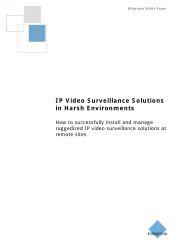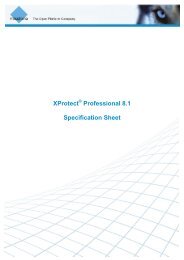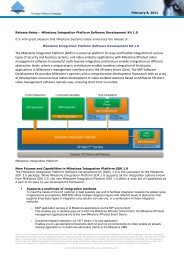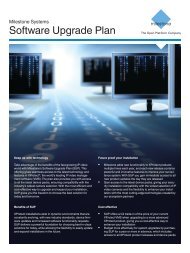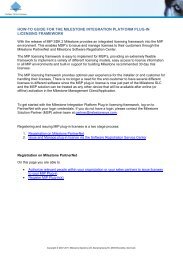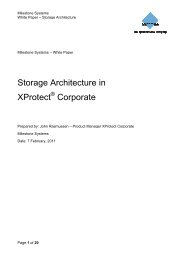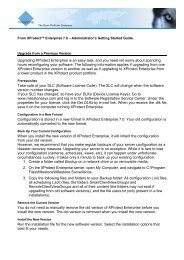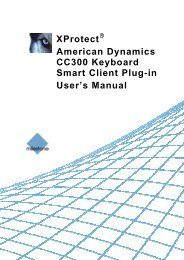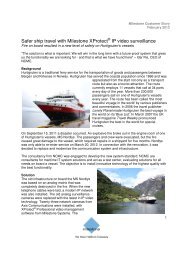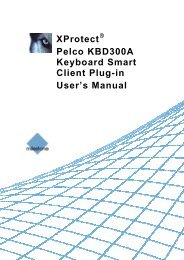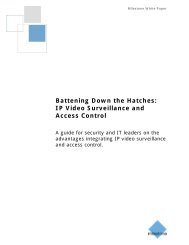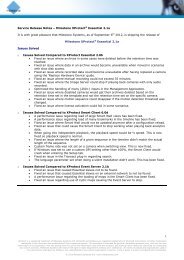XProtect Express 1.1; Administrator's Manual - Milestone
XProtect Express 1.1; Administrator's Manual - Milestone
XProtect Express 1.1; Administrator's Manual - Milestone
Create successful ePaper yourself
Turn your PDF publications into a flip-book with our unique Google optimized e-Paper software.
<strong>Milestone</strong> <strong>XProtect</strong> ® <strong>Express</strong> <strong>1.1</strong><strong>Administrator's</strong> <strong>Manual</strong>Same drive: Automatic moving or deletion of archives if drive runs out of disk spaceIf the <strong>XProtect</strong> <strong>Express</strong> server is running out of disk space, and the archiving drive is identical to the cameradatabase drive, <strong>XProtect</strong> <strong>Express</strong> will automatically do the following in an attempt to free up disk space:1. First, the program will attempt to move archives (moving archives is only possible if you use dynamicarchiving, with which you can archive to several different drives). This will happen if:othere is less than 15% disk space left, and the available disk space goes below 40 GB plus 2 GB percamera- or -othe available disk space goes below 225 MB plus 30 MB per camera (example: with ten cameras,the server would be running out of disk space if the remaining available disk space went below 525MB (225 MB plus 30 MB for each of the ten cameras))The difference ensures that very large disks will not necessarily be considered to be running out of diskspace just because they have less than 15% disk space left.2. If moving archives is not possible, <strong>XProtect</strong> <strong>Express</strong> will attempt to delete the oldest archives. This willhappen if:othere is less than 10% disk space left, and the available disk space goes below 30 GB plus 1.5 GBper camera- or -othe available disk space goes below 150 MB plus 20 MB per camera (example: with ten cameras,the server would be running out of disk space if the remaining available disk space went below 350MB (150 MB plus 20 MB for each of the ten cameras))The difference ensures that very large disks will not necessarily be considered to be running out of diskspace just because they have less than 10% disk space left.IMPORTANT: You will lose data from the archives being deleted.3. Ultimately, if there are no archives to delete, <strong>XProtect</strong> <strong>Express</strong> will attempt to resize camera databasesby deleting their oldest recordings. This will happen if:othere is less than 5% disk space left, and the available disk space goes below 20 GB plus 1 GB percamera- or -othe available disk space goes below 75 MB plus 10 MB per camera (example: with ten cameras, theserver would be running out of disk space if the remaining available disk space went below 175 MB(75 MB plus 10 MB for each of the ten cameras))The difference ensures that very large disks will not necessarily be considered to be running out of diskspace just because they have less than 5% disk space left.IMPORTANT: You will lose the data deleted as part of the database resizing process.When the recording server is restarted upon such database resizing, the original database sizes will beused. You should therefore make sure the drive size problem is solved, or adjust camera database sizesto reflect the altered drive size.Tip: Should the database resizing procedure take place, you will be informed on-screen in the Smart Client, in logfiles, and (if set up) through an e-mail notification.1. First, <strong>XProtect</strong> <strong>Express</strong> will attempt to delete archives. This will happen if:www.milestonesys.com 122 Advanced configuration



